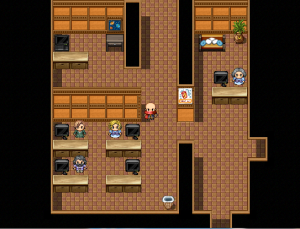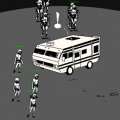Some games are not meant to be fun– at least, not in the conventional gaming sense.
Games like Dys4ia, Actual Sunlight, and Depression Quest are personal works of depression and hardship. They are meant to tell a story and convey a message; being fun is not the objective. Of course, just because something isn’t ‘fun’ doesn’t mean it isn’t engaging. Like reading a book with upsetting subject matter, these games are still recreational, and often enlightening.
Games like these are becoming more prevalent, and they’ve sparked a heated debate over the definition of ‘video game.’ A line has been drawn between formalists and zinesters. Formalists try to describe games as a type of play intertwined with mechanics and systems. Zinesters try to push the boundaries of games, believing games are tied to identity. Formalists have argued games like Actual Sunlight aren’t games. Zinesters disagree.
Does it matter? What is at stake in this argument?
“At a conversational level there’s no harm at all (in a broader definition of games). As I see it, the issue arises more when you get into trying to explain how games work, what was successful or unsuccessful design, and what lessons might be learned,” says Tadhg Kelly, author of the What Games Are blog.
Kelly calls himself a formalist. His recent blog post suggests he feels formalists are demonized by the zine movement.
“I believe that unless the zine movement starts to engage with outsiders on outsider terms (rather than demonize outsiders for not getting it) then there is a strong danger that it will become factional and invert on itself.”
Kelly’s been working with games for twenty years and he says movements like this pop up from time to time, but typically don’t last.
“These movements rarely change the baseline of games and what they are because they are generally about an internal conversation within their movement. They don’t, to borrow a phrase, cross the chasm very well.”
But having an internal conversation defeats the purpose of these games. They’re all made specifically to give the players a message. They are stories of pain and of hope.
If it is an internal conversation, a lot of people are listening. Dys4ia, Depression Quest, and Actual Sunlight are all covered extensively in games media. Actual Sunlight‘s creator Will O’Neill actually thinks the media attention for his game is disproportionate to the number of people who have actually played it.
 O’Neill is “unbelievably proud” of his work, but considers Depression Quest to be more broadly appealing and a better representation of how games as art will break into the mainstream.
O’Neill is “unbelievably proud” of his work, but considers Depression Quest to be more broadly appealing and a better representation of how games as art will break into the mainstream.
Of the three zinester game examples, Depression Quest gives the player the most control over the story. Dys4ia and Actual Sunlight are not meant to be ‘won.’ Being able to put players in a no-win scenario is one of the reasons O’Neill chose a game to tell his story. The medium is the message.
“I realized that allowing the player to actually experience the loss of agency over Evan as the game goes on was powerful in a way that a book could never express. To the extent that art is about the ability to empathize with something, I think gaming might be the most powerful artistic medium there is,” says O’Neill.
O’Neill considers Actual Sunlight both an interactive story and a game.
“I don’t really care what anyone calls it so long as they concede it is art. I think people failing to distinguish games in that way is what threatens and holds back the medium.”
Leigh Alexander, a widely published freelance games journalist and Gamasutra’s editor-at-large, has asked lots of developers whether they care what their game is called. She says a big issue is often these types of games are made by people who are historically under-represented. She sees their exclusion as a highly politicized act. Discussions that appear to be about systems and definitions are actually tied to identity.
“It’s hard to feel sympathetic toward the argument that ‘some things are Real Games and some things are not’ when we have wildly expressive and experimental work from women and the queer community — people who have been waiting a long time to feel wanted, welcome and included in the games space — and the traditional community, which is mostly white dudes, wants to add yet another form of exclusion in the form of the formalist definitions argument,” says Alexander.
People who have spent their whole lives struggling to belong are again being told they don’t belong.
Both Kelly and Alexander say this debate is nothing new. Alexander says it’s a hot topic right now because there’s a been a recent explosion of small, personal games due to the availability of free game-making tools. She thinks the political context has made the debate more heated this time around.
Alexander, herself, is very passionate on the subject. She believes formalists are shutting people out. They should be encouraging growth.

Kelly says formalists are not trying to put game makers in their place. Instead, they want to learn from games, see what worked, and translate it so others can use that information. Alexander doesn’t think formal definitions are as important as new game forms, new voices, and new ideas.
“I don’t know why you wouldn’t hear people getting upset about this and instead acknowledge that you might be in a position of privilege and that you can’t relate to how others might feel. What do you lose by seeing how the space evolves and unfolds rather than putting yourself into the position of legislator? Formalists don’t know everything — that’s why games are suffering extreme economic decline and arrested development,” says Alexander.
Are formalists holding games back? Are zinesters bringing in a new era of experimental games? Tell us what YOU think.
© 2013, The Indie Mine. All rights reserved.




